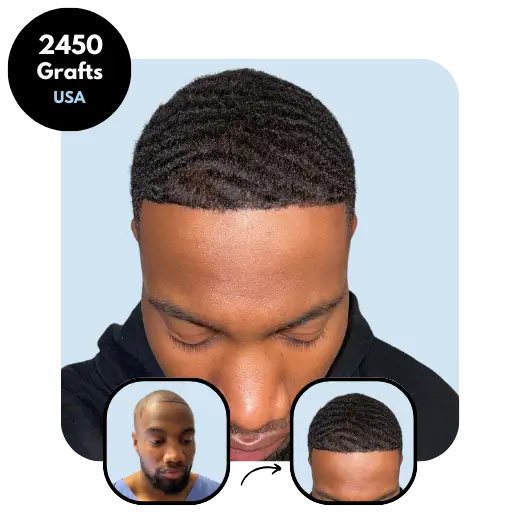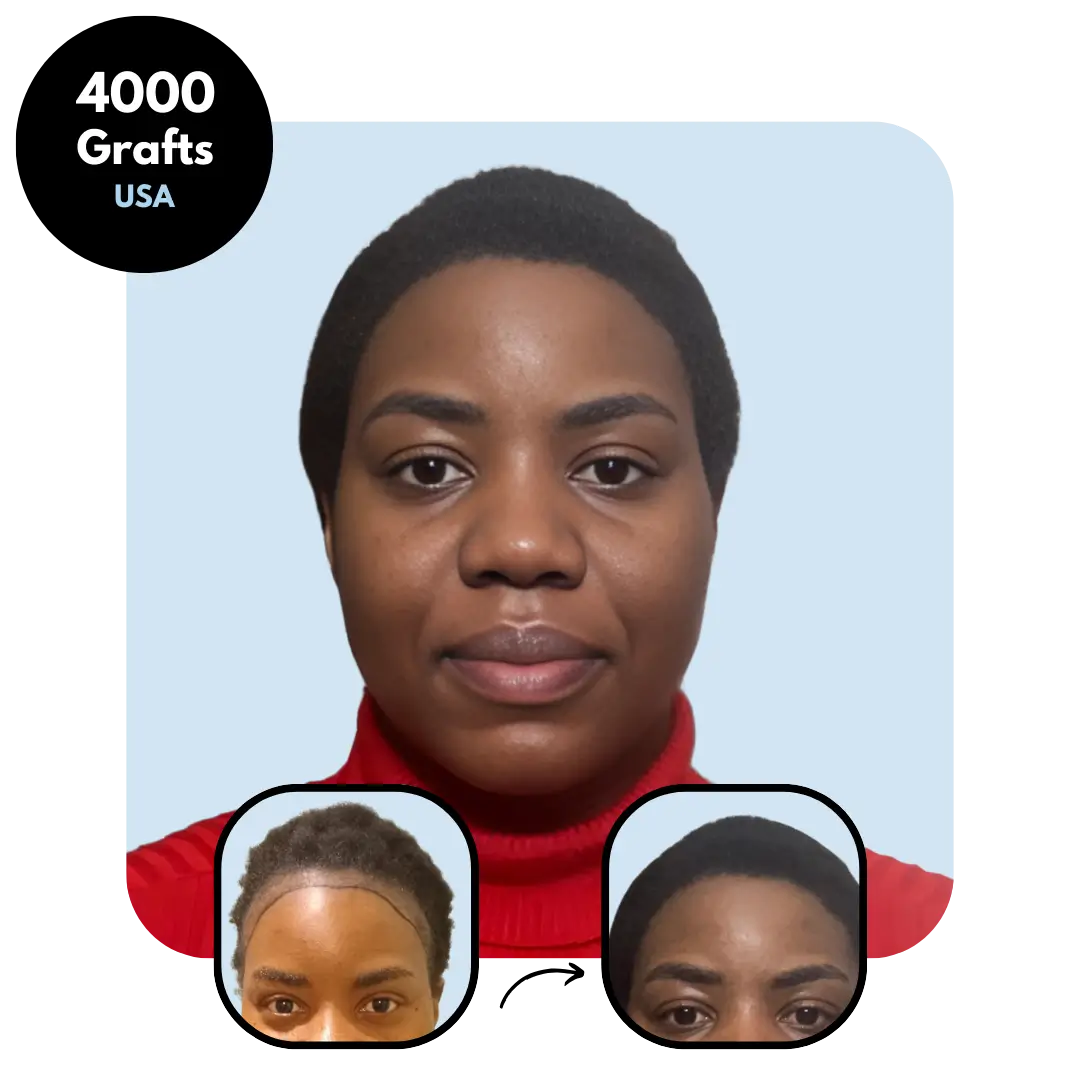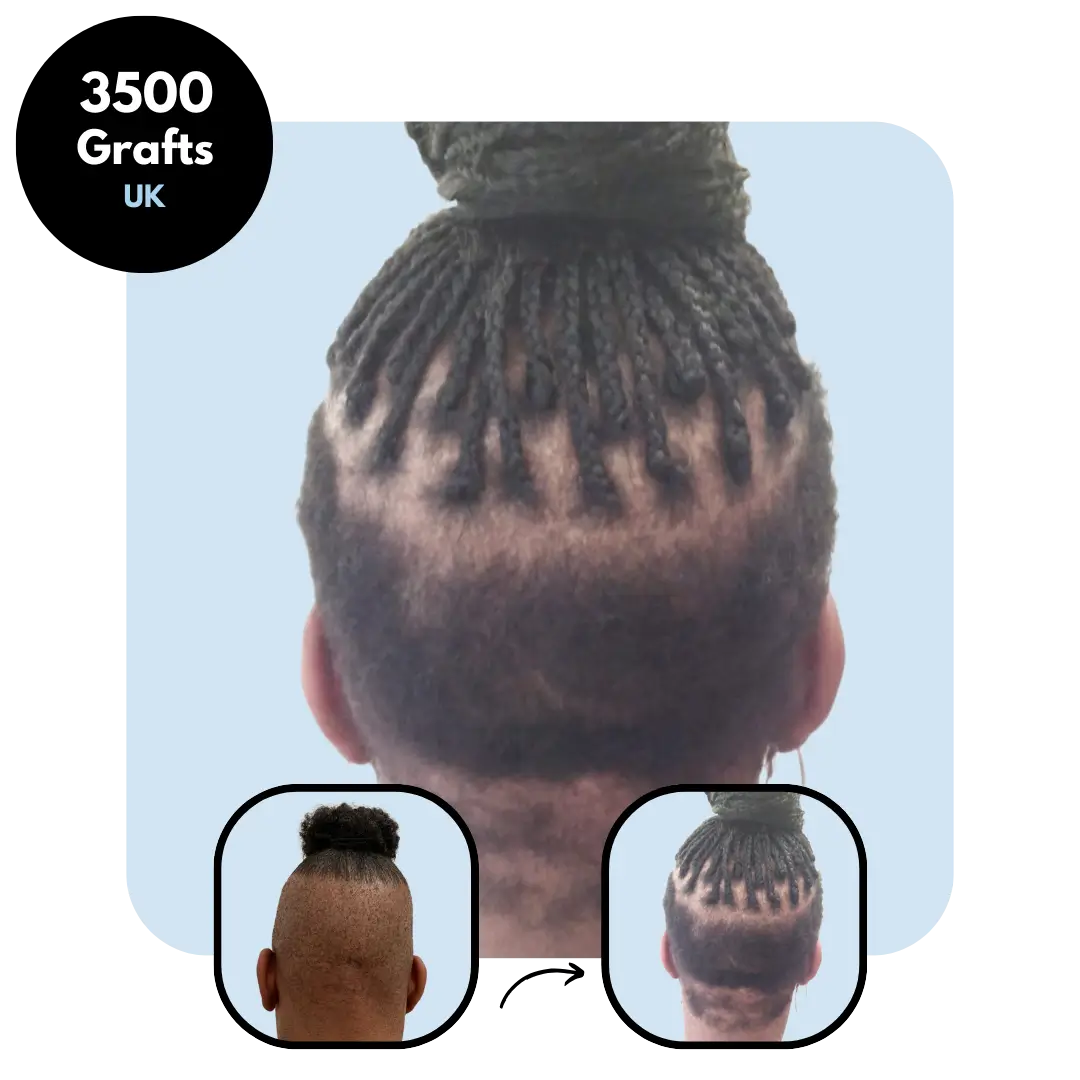Last edited, 11 February 2025
Do you know that people with Afro-textured hair face unique challenges when it comes to hair transplants? While hair loss is a common issue across all ethnicities, Afro hair presents distinct characteristics that require specialized expertise.
At IdealofMeD, we understand the intricacies of Afro hair transplants and have developed a tailored approach to meet the needs of our patients.
Afro-textured hair is known for its coiled structure and naturally thicker follicles. These qualities require a delicate and specialized touch during the transplant process to ensure natural-looking, dense results. Despite the unique challenges, IdealofMeD has consistently delivered exceptional outcomes for patients with Afro hair, thanks to our team of highly skilled surgeons and advanced techniques.

Before/After Catalog
Why Afro Hair Transplant is Different
Unlike straight or wavy hair, Afro-textured hair grows in a curved follicular pattern. This makes extracting and implanting grafts more challenging, but also more rewarding when performed correctly. IdealofMeD’s experienced team is well-versed in managing these nuances, ensuring that every graft is handled with care to preserve its natural curl and thickness.
Our team also understands the cultural significance of hair in Afro communities, where hair plays an essential role in personal identity and self-expression. This awareness fuels our dedication to providing top-notch, tailored hair transplant services in Turkey that not only restore hair but also boost confidence and enhance self-image.
Table of Contents
IdealofMeD's Hair Transplant Packages

Want to know what we offer? In the table below you will find a detailed breakdown explaining exactly what our two main hair transplant packages include. Scroll down to read more and don’t hold back from reaching out to one of our specialists if you can’t find what you’re looking for.
When it comes to Afro hair transplants, IdealofMeD stands out with its dedicated team and patient-centered approach. Here’s why patients choose us:
- Specialized Expertise: Afro hair requires a different level of skill, and our surgeons are highly trained in techniques like Follicular Unit Extraction (FUE) and Direct Hair Implantation (DHI), specifically adapted for Afro-textured hair.
- State-of-the-Art Technology: At IdealofMeD, we specialize in cutting-edge manual hair restoration methods that prioritize precision, artistry, and individualized care over automated approaches like the ARTAS robotic system. Our team of expert surgeons relies on years of experience and advanced conventional techniques to deliver natural-looking results.
- Natural-Looking Results: Our transplants blend seamlessly with your natural hair, maintaining the integrity of each follicle’s curl and ensuring that your new hair looks and feels like your own.
| Description | Standard | Premium |
|---|---|---|
| Hotel | 3 Nights | 5 Nights |
| 5 star hotel with amazing breakfast | single room | double room |
| Hair Restoration Box (pre op) | ||
| Hair Transplant Box (post op) | yes | |
| Hair Rejuvenation products | ✘ | 12 months |
| FUE Sapphire | ||
| ICE FUE Sapphire | ||
| Direct Hair Transplant (DHI) | ||
| Ideal FUE/DHI Combination Surgery | Extra cost | included |
| Specifically designed for women | ||
| 3-4 people surgical team | ||
| 6-8 people surgical team | extra | |
| Light meal during surgery | ||
| Anti-aging box | ✘ | ✘ |
| Transplant area healing duration | 5-6 days | 4-6 days |
| Trauma and Scalpe Tissue Damage | ✘ | ✘ |
| VIP transfer | ||
| Mesotherapy | no | 1 treatment |
| Booster Shot | 1 | 2 |
| Growth Therapy | ||
| Dental checkup | ✘ | |
| Dental cleaning | ✘ | |
| Health Checkup | ✘ | ✘ |
| Epigenetic test (biological age) | ✘ | ✘ |
| HyperBaric Chamber | 1 HBOT | 2 HBOT |
| Graft Survival Rate (ICE method) | 98.80% | 98.80% |
| Washing Hair | 1 Wash | 3 Washs |
Common Causes of Afro Hair Loss
Afro hair loss can result from various factors, many of which are different from those affecting other hair types. Here are some common causes:
- Traction Alopecia: This form of hair loss is prevalent among those who wear tight hairstyles like braids, weaves, or ponytails over an extended period. Constant tension on the scalp weakens hair follicles and leads to permanent hair loss.
- Genetic Factors: Like others, individuals with Afro-textured hair can experience androgenetic alopecia, a genetic condition that results in thinning and hair loss, typically along the hairline and crown.
- Alopecia Areata: An autoimmune condition that causes patches of hair to fall out, it disproportionately affects those with Afro-textured hair.
- Hormonal Changes: Hair loss can be triggered by hormonal shifts related to pregnancy, menopause, or thyroid disorders.
Different Types of Afro Hair Transplant Techniques at IdealofMeD
At IdealofMeD, we offer advanced techniques tailored to the specific needs of Afro hair:
FUE (Follicular Unit Extraction): FUE is a minimally invasive procedure that involves extracting individual hair follicles and transplanting them to areas of thinning or balding. For Afro hair, FUE requires a skilled approach due to the curvature of the hair follicles.
DHI (Direct Hair Implantation): DHI allows for precise control when implanting each graft, ensuring the angle and depth of each follicle matches the natural growth pattern. This method is particularly beneficial for Afro hair, where maintaining the hair’s curl pattern is crucial for natural-looking results.
FUE x DHI Combination: By combining FUE for maximum graft extraction and DHI for careful placement, IdealofMeD’s FUE x DHI Combination technique achieves high-density results while preserving the unique structure of Afro-textured hair.
Benefits of an Afro Hair Transplant in Turkey with IdealofMeD
Choosing IdealofMeD for your Afro hair transplant offers several distinct advantages:
- No Visible Scars: Both FUE and DHI methods leave minimal scarring, even for Afro-textured hair, allowing you to wear your hair short without worrying about noticeable scars.
- Natural results: The techniques we use ensure that the transplanted hair blends seamlessly with your natural hair, preserving your hair's natural curl and volume.
- Quick Recovery: Our minimally invasive procedures require no stitches, allowing for faster healing with minimal discomfort.
- Affordability: Hair transplant costs in Turkey are significantly lower than in other countries, and IdealofMeD offers up to 70% savings without compromising on quality.
Hi! My name is Mira and I’m your expert in achieving the best hair transplant results, as well as your person for all things hair maintenance and vitality related.
Feel free to connect with me or one of our IdealofMeD specialists today! Don’t hesitate to reach out if you have any questions or need guidance regarding hair transplant results.
We’re here to support you on your journey to achieving the best possible outcomes for your hair transplant and making sure your mane is as vibrant as possible!
- we are online
Is an Afro Hair Transplant Right for You?

If you’re experiencing hair loss and are looking for a solution that provides natural, long-lasting results, IdealofMeD can help. However, there are a few factors to consider when determining if you’re an ideal candidate for an Afro hair transplant:
- Age: It’s generally recommended that candidates for hair transplants are over the age of 25. This is because hair loss patterns tend to stabilize as you get older, giving surgeons a clearer understanding of how to best approach your treatment. Younger patients may experience ongoing hair loss after the transplant, which could affect the long-term results.
- Health: Your overall health plays a significant role in the success of a hair transplant. Ideal candidates should be in good general health and free from conditions that may impair healing, such as uncontrolled diabetes or autoimmune diseases. Smoking or excessive alcohol consumption can also hinder the healing process, so it’s important to be transparent with your specialist about your lifestyle.
- Hair Density: For a successful Afro hair transplant, it’s crucial to have a healthy donor area with a sufficient number of viable hair follicles. Afro-textured hair is often more densely packed, which can be an advantage. However, if hair loss has severely affected your donor area, you may not have enough healthy grafts to achieve the desired results in one session. In some cases, multiple sessions may be required.
Feel free to reach out to IdealofMeD’s specialists for a free consultation today. Let us help you take the first step toward reclaiming your hair with a treatment that understands and respects the unique beauty of Afro-textured hair.
Afro Hair Transplant Preparation in Turkey

Preparing for an Afro hair transplant requires specific care to ensure the best results. Below are some essential tips to help you get ready for your upcoming procedure in Turkey:
- Stop Vitamin and Supplement Use: At least two weeks before surgery, discontinue using vitamins and supplements, especially those containing Vitamin E, as they can thin the blood and increase the risk of bleeding during the procedure.
- Avoid Aspirin and Blood Thinners: Refrain from taking aspirin or other blood-thinning medications two weeks before the operation. If you need pain relief, opt for Tylenol (acetaminophen), as it doesn't have blood-thinning effects that could lead to excessive bleeding during surgery.
- Limit Alcohol Consumption: Alcohol is a blood thinner and can interfere with the healing process. It's best to stop consuming alcohol at least one week before your transplant to avoid complications during surgery.
- Hair Health: Ensure that your scalp is in optimal condition by avoiding tight hairstyles like braids or weaves at least a week before the procedure. These styles can stress the scalp and hair follicles, potentially affecting the transplant’s success.
- Stop Intense Physical Activity: At least one week before your hair transplant, refrain from high-intensity exercises like running or jogging, as these can cause your blood platelets to thin, increasing the risk of excessive bleeding. Light exercise is fine, but avoid anything that raises your heart rate too much.
- Maintain a Healthy Scalp: Afro-textured hair tends to be more prone to dryness, so make sure your scalp is well-moisturized but free from heavy oils or buildup. A healthy, clean scalp will allow for a smoother procedure and recovery.
- Get Plenty of Rest: The night before your surgery, make sure you get enough rest to help your body prepare for the procedure. Proper sleep will also aid in recovery, as your body repairs itself best during rest.
Uncovering the Causes of Hair Loss in Afro-Textured Hair
It’s a myth that hair loss only affects caucasian/straight hair types. Men and women with Afro-textured hair can experience hair loss for a variety of reasons, which may be specific to the unique characteristics of their hair.
Let’s explore some of the main causes of hair loss in people with Afro hair:
Genetic Factors: Both men and women with Afro-textured hair can experience androgenetic alopecia, commonly known as pattern hair loss. This hereditary condition affects millions of people worldwide. For men, hair loss may start at the temples or crown, while women typically experience thinning around the crown and top of the head. The tightly coiled structure of Afro-textured hair can make hair thinning more noticeable as the hair density reduces.
Hormonal Changes: Hormonal fluctuations can trigger hair loss in both Afro men and women. Dihydrotestosterone (DHT), a hormone produced from testosterone, shrinks hair follicles and leads to hair thinning in both sexes. Women may experience hormonal-related hair loss during menopause or pregnancy, while men often encounter it with age. Hormonal imbalances caused by conditions like polycystic ovary syndrome (PCOS) or thyroid disorders can also contribute to hair loss in Afro individuals.
Traction Alopecia from Hairstyles: A common cause of hair loss in Afro communities is traction alopecia, which results from tight hairstyles like braids, weaves, dreadlocks, and tight ponytails. These styles can pull on the hair follicles, causing hairline thinning, especially around the edges. Prolonged tension can weaken the hair roots and lead to permanent hair loss in both men and women.
Stress and Lifestyle Factors: High levels of stress can trigger hair loss by pushing hair follicles into a resting phase, leading to shedding. Lifestyle factors such as smoking, poor diet, and lack of hydration can also negatively impact hair health, particularly in Afro hair that tends to be more prone to dryness. Maintaining a healthy diet, avoiding smoking, and reducing stress are key to preventing hair loss.
Scalp Conditions and Medical Issues: Afro-textured hair can be more vulnerable to scalp issues like seborrheic dermatitis, psoriasis, and fungal infections, which can lead to hair thinning or bald patches. Men and women are equally susceptible to scalp conditions and autoimmune diseases such as alopecia areata, which causes sudden hair loss. Medical treatments, including chemotherapy, can also result in temporary or permanent hair loss.
What to Expect After an Afro Hair Transplant in Turkey?

Undergoing an Afro hair transplant in Turkey is an exciting step toward restoring your hair and confidence. However, it’s essential to know what to expect after the procedure to ensure the best possible results and proper care for your newly transplanted hair.
1. Immediate Post-Op Care
Right after the procedure, your scalp will feel sensitive, and some minor swelling or discomfort is common. You’ll receive detailed aftercare instructions from your surgeon, including:
- Rest and Elevation: Rest is crucial during the first few days post-surgery. Keeping your head elevated while sleeping can help reduce swelling.
- Avoid Touching: It’s important not to touch or scratch the transplanted area, as the grafts need time to settle.
2. Scab Formation and Shedding
In the first week, small scabs will form around the transplanted follicles. This is a normal part of the healing process. After about 10-14 days, these scabs will naturally fall off.
You may notice some shedding of the transplanted hair, which can be concerning, but this is a standard part of the “shock loss” phase. It simply means your hair is preparing for new growth, and within a few months, healthy, strong hair will start to emerge.
3. Growth Timeline for Afro Hair
Afro-textured hair grows differently from other hair types due to its curly or coiled structure, which may affect how quickly results are visible. Here’s a general timeline of what you can expect:
3-4 Months: This is when the first signs of new hair growth begin. Afro hair may appear thinner at first, but as it grows out, the natural curls or coils will become more noticeable, creating density.
6-9 Months: By this point, a significant amount of growth will have taken place. The hair will continue to thicken as the follicles establish themselves.
12-18 Months: At the one-year mark, most people with Afro hair will see their full results, with thick, natural-looking curls or coils fully restored. Afro-textured hair may take a little longer to reach its final density compared to other hair types, but the end result is often impressive.
4. Aftercare for Afro-Textured Hair
Proper care is essential to ensure the longevity of your transplant. Afro-textured hair requires specific care to avoid breakage and maintain moisture:
Moisture is Key: Afro hair tends to be drier than other types, so keeping it moisturized is crucial. Use gentle, hydrating shampoos and conditioners designed for curly or coiled hair.
Low-Tension Styling: Avoid hairstyles that put excessive tension on your hair, such as tight braids or weaves, as they can lead to traction alopecia, which may damage your new grafts.
Protective Hairstyles: Opt for protective styles like twists or loose braids to reduce strain on your hair, especially in the early months after the procedure.
The Psychological Toll of Hair Loss on People with Afro Hair
For people with Afro-textured hair, hair loss carries a unique emotional and cultural weight. Afro hair is often a symbol of identity, pride, and heritage, so its loss can deeply affect self-esteem and mental well-being.
Culturally, Afro hair stands for resilience and beauty, making hair thinning or loss feel like a disconnection from one’s roots. This can lead to insecurity and anxiety, especially in societies that favor Eurocentric beauty standards.
Styling practices, such as tight braids and chemical treatments, often lead to traction alopecia, causing frustration and self-blame. The psychological impact can manifest as anxiety, depression, and social withdrawal.
However, specialized solutions like Afro hair transplants are here to offer some hope, helping people regain not only their hair but their confidence and sense of self.
How to Maintain Your Hair After an Afro Hair Transplant in Turkey
Proper aftercare is crucial for maintaining the results of your Afro hair transplant and ensuring long-term success. Here are some key tips to follow:
- Gentle Hair Washing: Avoid washing your hair for the first few days post-surgery. Once approved by your doctor, use a gentle, sulfate-free shampoo to clean your scalp without irritating the newly transplanted hair follicles. And remember to opt for lukewarm water!
- Avoid Heat and Tight Hairstyles: Limit the use of heat styling tools like flat irons, and refrain from tight hairstyles such as braids, twists, or ponytails that may put stress on your scalp and cause traction alopecia.
- Moisturize and Protect Your Scalp: Afro-textured hair is naturally prone to dryness. Apply light, nourishing oils or leave-in conditioners to keep your scalp hydrated. This helps maintain hair health while promoting healing.
- Follow Medical Advice: Stick to the prescribed medications and any topical treatments provided by your surgeon. Anti-inflammatory and antibiotic treatments may be recommended to prevent infection and aid in the healing process.
- Healthy Lifestyle Choices: Eating a balanced diet rich in vitamins and minerals, particularly biotin, zinc, and iron, supports hair growth. Additionally, reducing stress through mindfulness or exercise can improve hair health overall.
- Sleeping Position: For the first few nights after surgery, sleep with your head elevated using pillows. This minimizes swelling and prevents your scalp from coming into contact with the pillow, which could dislodge grafts or irritate the scalp.
You Had an Afro Hair Transplant in Turkey? Here's What You Can Expect in Terms of Growth
The growth that can be anticipated at each step of your post-hair transplant recovery is shown on this growth chart. The rate at which each person’s hair grows will vary. Although these timelines are expected, your hair transplant may result in faster or slower hair growth.
After Surgery | Potential Hair Growth |
Immediately | No growth will be visible immediately. |
5 to 10 days | No visible change, scalp is still healing. |
2 to 3 weeks | You may notice shedding of hair grafts, which is normal and part of the process. |
4 to 8 weeks | Initial hair growth may begin, typically up to 0.5 cm, hair texture may vary. |
4 to 6 months | Hair growth becomes more visible, you can start to see the potential of the final results. |
12 to 18 months | Full, thick, and natural-looking results from the transplanted hair. |
Remember: Individual experiences may vary based on factors such as hair type, transplant technique, and adherence to aftercare instructions. It’s essential to maintain realistic expectations and be patient during the healing and growth process.
More Hair Transplant Treatments Articles
Frequently Asked Questions
A qualified medical expert can do hair transplants with success rates of up to 95%–98%.
An afro hair transplant in Turkey is absolutely pain-free but could cause a bit of discomfort.
The final results will be visible somewhere around the 12 month mark after your hair transplant, so be patient and trust the process!
After your afro hair transplant in Turkey, you must use a gentle shampoo free from sulfates to wash your hair. Since afro hair is often associated to a higher scalp dryness, we recommend you moisturize your scalp with natural oils or sulfate-free conditioners too,
- we are online
Schedule For Later
About IdealofMeD
Sources & expertise
We have used the following sources to compile this page:
Information checked by an expert
Mira Zagorova
The information on this page is checked by Mira Zagorova. She’s an expert on hair loss & restoration and often asked to share her knowledge.
Awards & accreditations



IdealofMeD Hair Transplant
We’re you’re number 1 destination for a hair transplant in Turkey. Don’t forget to check out our other pages about hair transplant results, or read up on our exclusive DHI & FUE Combination Surgery.







